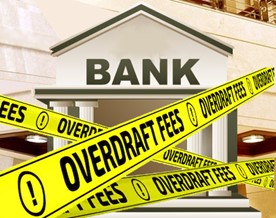ACCC explains the different types of banking fees consumers need to be aware of
Boston, MA – July 23, 2018

“Many banks charge fees – big and small – that cover a variety of items and actions that customers may not even be aware of,” said Steve Trumble, President, and CEO of American Consumer Credit Counseling. “It is important for consumers to contact their bank and ask for a list of all possible fees so they can do their best to avoid them.”
The recent MoneyRates.com Checking Account Fee survey found that checking account fees have increased in the last six months and include all major categories such as overdraft, maintenance and ATM fees. According to the survey, overdraft fees are up nine percent, maintenance fees are up eight percent and ATM fees are up 11 percent compared to five years ago. More online banks (70 percent) are offering no maintenance fees compared to traditional bank branches (25 percent).
American Consumer Credit Counseling discusses the most common types of banking fees.
- Maintenance fees – Many banks often charge maintenance fees, whether they be monthly or annually. It is important to be aware of your banks policy to see if you are being charged a maintenance fee and if there is a way you can avoid it.
- Overdraft fees – If you have overdraft protections, your payments will go through, but over-drafting comes with a $35 fee. This fee is charged each time you overdraft, even if you only spend a couple dollars more than what’s in your account. It is important to be aware of the amount of money you have in your account at all times so you are not charged an unnecessary overdraft fee.
- Paper statements – Many banks are trying to encourage customers to use online banking services by charging a fee for every paper statement. Although it may not seem like much, a $2 fee for each paper statement can add up over time. Consider utilizing electronic statements to avoid this fee.
- Minimum balance – Some banks are charging customers with low balances. Make sure you review your bank’s policy to see how much money you must maintain in your account to avoid unwanted fees.
- Foreign transactions – Some banks will charge customers a fee for making a purchase in a foreign country with their U.S. credit card. These fees are usually a percentage of the purchase. Do some research and see if your bank charges fees for foreign transactions and if there are options for cards that do not charge these fees.
- ATM fees – ATM owners charge a fee to consumers who use ATMs that are not affiliated with their bank. Use only ATMs that are either owned by or affiliated with your bank to avoid these unnecessary fees.
- Misplaced cards – It’ll cost you if you accidently misplace your card. Most banks will charge consumers to get a replacement card. Those costs can increase even more if you need expedited shipping.
About American Consumer Credit Counseling
American Consumer Credit Counseling (ACCC) is a nonprofit credit counseling 501(c)(3) organization dedicated to empowering consumers to achieve financial management through credit counseling, debt management, bankruptcy counseling, housing counseling, student loan counseling and financial education concerning debt solutions. To help consumers reach their goal of debt relief, ACCC provides a range of free consumer personal finance resources on a variety of topics including budgeting, credit and debt management, student loan assistance, youth and money, homeownership, identity theft, senior living, and retirement. Consumers can use ACCC’s worksheets, videos, calculators, and blog articles to make the best possible decisions regarding their financial future. ACCC holds an A+ rating with the Better Business Bureau and is a member of the National Foundation for Credit Counseling® (NFCC®). For more information or to access free financial education resources, log on to ConsumerCredit.com or visit https://www.consumercredit.com/debt-resources-tools/
